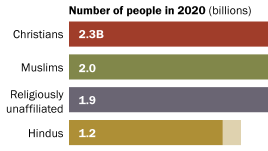
How religious is your state?
Explore our interactive database to find out how religious adults are in your state based on service attendance, prayer, belief in God, and importance of religion.
Numbers, Facts and Trends Shaping Your World
Explore our interactive database to find out how religious adults are in your state based on service attendance, prayer, belief in God, and importance of religion.
All
Publications
One year out from the presidential election, Romney and Perry had roughly equal support among registered Republican and Republican-leaning evangelicals, and both led Obama in a hypothetical matchup.
How do Americans view the Mormon faith and its followers? What is the public’s attitude toward Mormon presidential candidates? Explore the Pew Research Center’s resources on Mormonism and The Church of Jesus Christ of Latter-day Saints, including a poll on the public’s perceptions of a Mormon candidate, a profile of Mormons based on survey data, […]
Highlights from the Pew Research Center report, Muslim Americans: No Signs of Growth in Alienation or Support for Extremism.
As the 10th anniversary of the 9/11 attacks approaches, a comprehensive public opinion survey finds no indication of increased alienation or anger among Muslim Americans in response to concerns about home-grown Islamic terrorists, controversies about the building of mosques and other pressures that have been brought to bear on this high-profile minority group in recent years.
Restrictions on religious beliefs and practices rose in 23 of the world’s 198 countries (12%), decreased in 12 countries (6%) and remained essentially unchanged in 163 countries (82%) between mid-2006 and mid-2009, a new Pew Forum report shows. More than 2.2 billion people – nearly a third of the world’s population – live in the 23 countries with increasing government restrictions or social hostilities involving religion.
Muslim and Western publics continue to largely agree that relations between them are poor, and disagree about who is at fault – Muslims largely blame Westerners, while those in the West generally blame Muslims. However, in both Western and predominantly Muslim nations, there is a shared concern about the threat posed by Islamic extremism.
Nearly half of U.S. adults are connected to Catholicism. Read about going to Mass, Communion, confession and more.
Christians remain the largest religious group, and Muslims grew the fastest from 2010 to 2020. Read how the global share of Buddhists, Hindus, Jews and the religiously unaffiliated changed.
After years of decline, the U.S. Christian share now shows signs of leveling off. The new Religious Landscape Study explores trends in identity, beliefs and practices.
The Global Religious Futures (GRF) project is jointly funded by The Pew Charitable Trusts and The John Templeton Foundation. Here are some big-picture findings from the GRF, together with context from other Pew Research Center studies.






